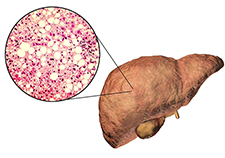Office of Research & Development |
 |


In bariatric surgery, surgeons make changes to the stomach and digestive system that limit the amount of food that can be eaten or absorbed, leading to weight loss. (Photo by Jeff Bowen, VA)
October 30, 2019
By Tristan Horrom
VA Research Communications
The results suggest that the primary benefit from bariatric surgery is in health and quality-of-life improvements, not cost-savings.
Despite health benefits of improved survival and significant weight loss, bariatric surgery may not lead to lower health care costs, according to a VA study. The 10-year study is the longest follow-up to date of long-term health care costs after bariatric surgery in the United States.
The study appears Oct. 30, 2019, in JAMA Surgery.
Obesity contributes to a number of health problems, such as diabetes and heart disease. When other treatments prove ineffective at weight loss, patients with severe obesity may be offered bariatric surgery.

MVP study offers new insights on genetic risk for non-alcoholic fatty liver disease

VA ear surgeon studies management of severe hearing loss in Veterans

Veteran disability payments led to fewer hospitalizations
Bariatric surgery achieves weight loss by restricting how much food the stomach can hold, by limiting how much food can be absorbed, or both. It includes several different procedures, such as gastric bypass, sleeve gastrectomy, and gastric banding.
Surgery can lead to significant and sustained weight loss, better survival, and better health. However, the surgery itself and management of post-surgical complications can be costly.
To address whether the health benefits of bariatric surgery lead to lower costs, the study team—led by Dr. Matthew Maciejewski of the Durham VA Medical Center and Duke University—compared more than 10 years of data on VA patients who had bariatric surgery with similar VA patients who did not. The study included nearly 10,000 Veterans with severe obesity, almost 2,500 of whom had bariatric surgery.
The results showed that patients who had bariatric surgery did not have lower VA health care costs in the 10 years after surgery. This finding was consistent with prior studies on non-Veterans and prior research by the same team on Veterans that compared costs three years after surgery.
The surgery group had higher VA costs in the 6 to 12 months before and in the first two years after surgery. Total health care costs were $1,400 higher for the surgery group than the non-surgery group at 12 months before surgery. In the six months after surgery, surgery patients had total VA costs that were $3,000 higher than their non-surgery peers.
Health care costs for surgery patients gradually decreased two years after surgery. By 5 to 10 years after surgery, they had similar total costs to matched non-surgery patients. The surgery patients had lower average pharmacy costs than the non-surgery group over the 10-year period, but this was offset by higher outpatient expenses. VA costs for surgical patients never dropped below those of the non-surgery patients.
Although it was not the focus of this study, the researchers proposed several reasons that may explain why the surgery group did not have lower costs years after their procedures. Despite better overall health, patients may still need to be treated for short-term complications of bariatric surgery. Surgery patients likely had higher inpatient costs in the months following bariatric surgery to treat surgical complications such as nausea, vomiting, and dehydration. They may also experience anemia and vitamin deficiencies that require management by VA providers.
Further, patients may have had higher costs from having additional procedures, such as for the removal of excess skin. Patients who lost weight also may have become newly eligible for hip or knee replacement surgeries for osteoarthritis. Finally, many conditions linked to obesity, such as diabetes, do not always go away once a patient loses weight and may require routine monitoring and follow-up.
The results suggest that the primary benefit from bariatric surgery is in health and quality-of-life improvements, not cost-savings. Maciejewski and coauthor Dr. David Arterburn of Kaiser Permanente Washington Research Institute noted in an email that "few health care treatments are required to be cost-saving or even cost-effective to be widely available, so requiring cost-savings of bariatric surgery imposes an unfair standard." They acknowledge that increasing access to bariatric surgery would obviously entail greater health-system costs.
Future research should focus on whether newer bariatric surgery procedures are able to reduce health care costs more than older procedures, say the researchers. For example, sleeve gastrectomy is less invasive than gastric bypass, but was performed on only 15% of the surgical patients in the study, given that it is a newer procedure. Sleeve gastrectomy could potentially be more cost-effective because of lower up-front costs and risks of complications, but further research is needed to explore this possibility.
The study was funded by VA Health Services Research and Development and the National Institute on Drug Abuse. To learn more about VA research into obesity, visit the topic page on the VA research website.
VA Research Currents archives || Sign up for VA Research updates